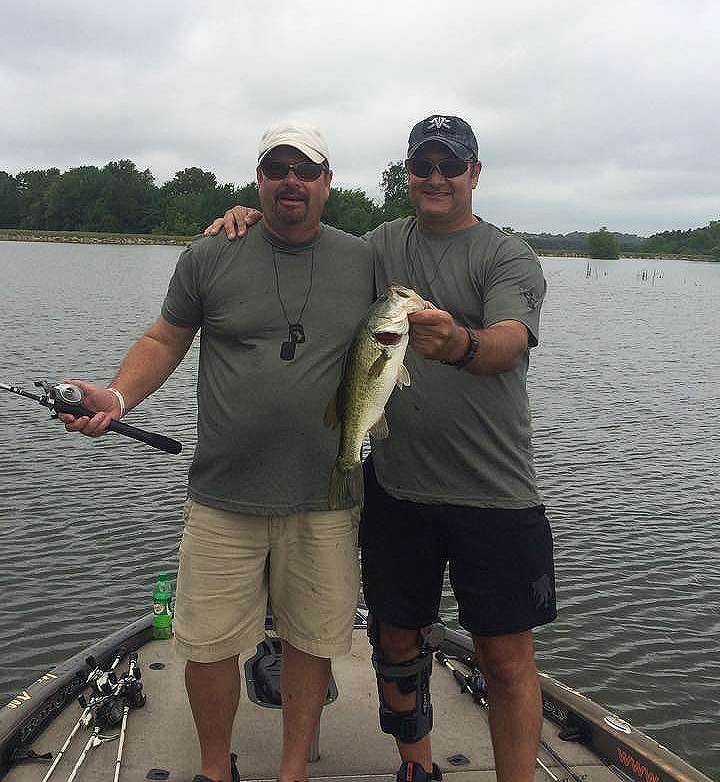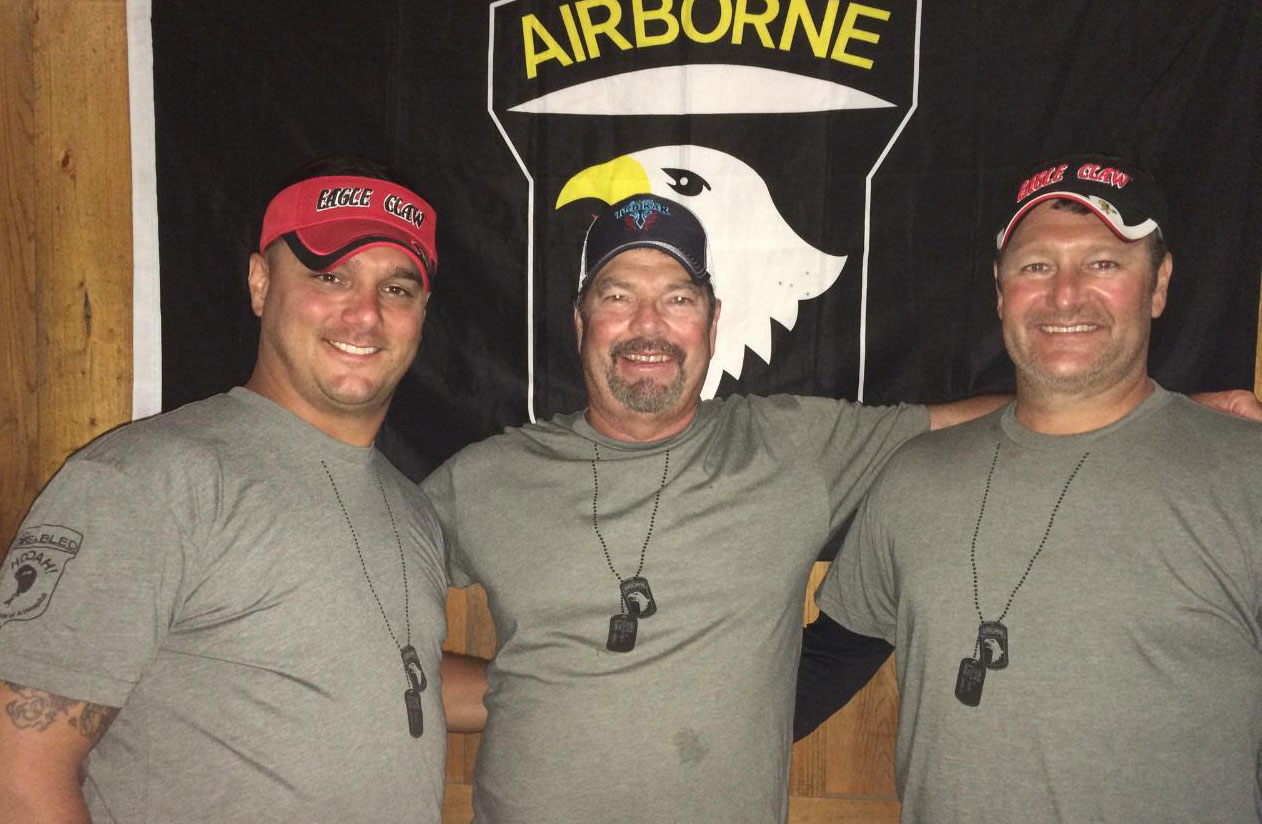
EUTAW, Ala. – Staff Sergeant Matthew Taylor flipped a spinnerbait toward the bank, reeling it back with a purpose.
Part of that purpose was to trick a bass into biting. But the main purpose for Taylor was to complete the task: Click the button, bend the rod, send the bait to the target, reel it back and somewhere in the process get caught up in hoping that a bass would bite and put up a fight.
Whether a bass bit or not didn’t matter. Every cast was part of Taylor’s healing. The simple things bass anglers take for granted have a healing power the U.S. Army has realized can help transition our nation’s warriors coming home from overseas with a dizzying number of physical and emotional wounds.
In 2011 Taylor was injured in a helicopter accident and was sent to the Warrior Transition Battalion (WTB) at Fort Campbell, Ky. There he was told he would be lucky, “if he wasn’t in a wheelchair within six months.”
“I called my wife with the news and told her ‘if I was ever confined to a wheelchair I might go into the woods and have a talk with God.’ I couldn’t guarantee her I’d return,” Taylor recalled.
“I was in a bad place.’’
What HOOAH! means
Weeks later Taylor accepted an invitation to a turkey hunt set up by a group of WTB soldiers called “HOOAH!.” Taylor would come back from that hunt with a turkey and a new lease on life. In all things military acronyms are a part of everything and in this case HOOAH! stands for “Healing Outside Of A Hospital.” Unlike most military acronyms it’s beautifully appropriate. HOOAH! is also generally accepted in military speak as a tacit approval, meaning “anything and everything except ‘no.’” That works too.
For Taylor, he would not only join HOOAH!, but start to oversee the program a year later.
The new position allowed Taylor to give out the invites that would change soldiers’ lives. He started taking wounded, active-duty soldiers fishing and hunting in 2012 and since more than 100 soldiers have relayed to him the program had “saved their life.”
Recently, Taylor and 10 other wounded soldiers were part of one of those trips at Leavellwood Lodge near Eutaw, Ala. Trey and Pam Montgomery, owners of Leavellwood, put on the annual event, formally titled the “Justin Junkin Honor Event.” It is held for as many as 15 wounded soldiers as a way of giving back, while honoring Junkin.
“It’s all about him,” Trey Montgomery said. Junkin was 26 years old when, after returning home from the conflicts in the Middle East, he took his own life.
Montgomery and Jeff Junkin (Justin’s father) are best friends and since then the Montgomerys have been committed to helping soldiers dealing with the trauma of war. This was their seventh event in six years.
Today, trips like these are taking place all over the country: Some of them under the Wounded Warriors umbrella and some of them under the Army’s formal Warrior Transition Battalions. The difference in the two is the WTB and the HOOAH! program at Fort Campbell are for active-duty soldiers.
Those attending receive an opportunity to heal, while those who help organize these events realize how simple things like casting to a bank and catching a fish, can be a healing process to heroes.
A prime example
Sergeant First Class (SFC) L.J . Planer is prime example of that. At the Leavellwood event, Planer was part of the line up of wounded soldiers. He stood with a walker, obviously with parts of his body broken and not working. Even with the walker, he stood tall; broad shoulders, square jaw and serious eyes. Despite the use and abuse he looked the part of a classic soldier.
On a resupply mission in Afghanistan Planer was injured severely. In talking about those injuries he is deliberate, meeting most questions with a long pause; not wanting to talk about it either from an emotional standpoint or an official one. The reason doesn’t matter.
The result was Planer lost the use of his hands, losing all feeling in his right arm with nerves severed in his right shoulder. Today he can’t feel his fingers, but mentions “I can lift a 1-pound barbell over my head seven times. I used to bench 250 as my workout weight.”
If that weren’t enough he suffered a hole through his kneecap that wiped out all use of his right leg. His spine was crushed and currently has two metal vertebrae in his neck and three in his back to keep him upright. His hip was dislocated. His hearing is impaired and requires hearing aids. And at one time he had lost his vision, which hasn’t completely come back.
Those things he says are just a start of the physical issues. Going over the emotional and mental ones are separate and equally long lists.

“Before I was injured, I hunted and fished all the time,’’ he said. “When I got injured it put me in a place where I couldn’t wipe my own butt.
“For a couple of years I didn’t do anything. I knew about the (HOOAH) program but I didn’t feel like I was physically able to go out and do it without being a burden on everybody else.
“I was depressed. Nobody really likes to say that. You think you are too much of a man to be depressed. But that was the truth of the matter. I was depressed. I had problems. I have a traumatic brain injury, problems with my sight, my hearing.
“All that came into play, not being able to see down the crosshairs in a gun, not being able to pick a gun up, not being able to throw a rod and reel. Not to be able to do any of that stuff, not to be able to shoot a bow.
“In my mind the devil got in there and was just making me depressed saying ‘you can’t,’ ‘you can’t,’ ‘you can’t,’ ‘you can’t.’ And when they took me on that hunting trip and made it possible for me to be able to do it. It was God working through Matt (Taylor) and the whole program. Now I know I can.”
If not for the HOOAH Program working with hunters and fishermen across the country, Planer would have likely set in his wheelchair and brooded over all those things lost. Taylor and the HOOAH program had other ideas.
“They pretty much came to my house and took me against my will on a hunting trip,” Planer said. “They had everything there setup for me, with my wheelchair and a way to shoot left handed, because I can’t use my right arm. Just made it happen for me and it was worth it.
“It put me back in the mindset of I can still be a part of something. I can still do something. Maybe not to the level I did before. But that atmosphere and that camaraderie and that kinship that you get when you’re around the campfire and in the camp: That experience renewed the fire in me to be able to push harder and took away the impression of not being able to do what I always did and loved to do.
“That experience told me ‘I could.’ I was just feeling sorry for myself. There’s people hurt 100 times worse than I am.”
At Leavellwood, Planer would sit in the passenger seat of Dalton Bobo’s boat pulling a weightless worm around as Bobo worked one of the half dozen reservoirs. Bobo, who is best known for almost winning the Bassmaster Classic in 1997, finishing second by 1 ounce, coordinates the guides for the event every year, calling it “an honor” to be able to help.
Most of the soldiers, all of them teamed up with top Alabama anglers, could cast. They all caught fish, including Planer.
“I couldn’t hold onto the pole very well,” he said. “I couldn’t fight some of the fish all the way to the boat, I had to get help. But to feel that tug on the line and that fight of a big fish, when you’re fighting that fish and that big old bass jumps out of the water, that’s adrenaline. That’s like a big shot of renewal and healing. That time out there on that water is very healing.
“It’s comforting. It’s relaxation and you can let everything kind of go from all your worries: From your disabilities, from your financial problems, to your relationship problems because of your disability, to your future of what it’s going to hold. Whether they’re going to kick you out of the military and you’re going to have to try and survive the best you can with your injuries outside.
“All that kind of went away and it was just you out there with your buddy and a big fish on the line. And then what you were worried about is trying to keep that line tight and the hook in his mouth and get him to the boat.
“All of the rest of that stuff kind of went away and for those times on the water, it was just pure fun and just no worries.”
Therapeutic value
It is those kinds of testimonials that lead the Army to recognize hunting and fishing as therapeutic two years ago.
“It’s really a big achievement for them to recognize that,’’ Taylor said.
While Taylor is based out of Fort Campbell in Kentucky, there are 22 Warrior Transition Battalion units scattered around the country. The impact has been startling.
“Our guys are seeing life differently for the first time,’’ Taylor said. “I had one of them tell me while we watched the sunrise the other day, that it was the first time he had ever seen a sunrise when he wasn’t being shot at.”
The idea of a peaceful sunrise is something most of us take for granted. But increasingly the U.S. Army is seeing time on the water as a way to heal the emotional and physical wounds of war.

